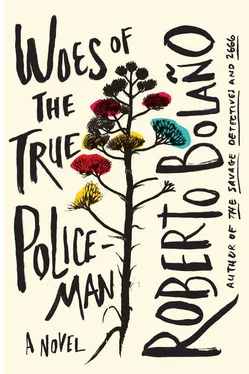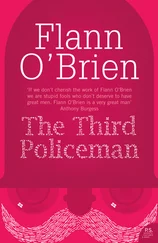To Amalfitano, Jordi seemed a shy and formal boy. Rosa liked his silence, which she mistook for thoughtfulness when it was really just a symptom of the confusion raging in his head. For both young people, each day that went by was like a sign, the announcement of an impending future full of significant events; Rosa suspected that the trip to Mexico would mark the end of her adolescence; Jordi sensed that their time together would torment him someday and he didn’t know what to do about it.
One night they went to a concert. Another night they went to a club where they danced for a long time like two strangers.
Who came to the airport? The Carreras — and, thirty minutes before boarding, Padilla and the poet Pere Girau. Jordi and Rosa’s farewell was silent. The Carreras and Amalfitano’s was traditional, a hug and good luck, write to us. Antoni Carrera knew the poet Pere Girau by reputation, but he greeted him politely. Anna Carrera, however, asked him whether his work had been published and if so where she could buy it. Jordi gave his mother an incredulous look. But you don’t read poetry, he said. Rosa — who, standing next to Jordi, looked much smaller than she was — said: it’s never too late to start, though I would choose something more classic, more solid. Like what, for example? asked the poet Pere Girau, who next to Jordi looked smaller, too (even smaller than Rosa), and who was hurt by the word solid . Padilla cast his gaze skyward. Amalfitano seemed to develop an interest in the fine print on his boarding passes. Catullus, said Rosa, he’s quick and fun. Oh, Catullus, said Anna, I read him ages ago, in college, I think, wasn’t it? Yes, said Antoni Carrera, we read him, of course. Jordi shrugged, but that was a long time ago, I’m sure you don’t remember any of it now. I haven’t been published yet, said the poet Pere Girau with a smile, though this year a collection of mine is coming out with Cavall amb Barretina, the new Catalan publishing house. And do you write poetry too? Anna asked Padilla. Yes, ma’am, but in Spanish, which means there’s no chance I’ll be published by Cavall amb Barretina. But there are other places where you could be published, aren’t there? Or so I imagine. What do you think, Toni? Of course there are other places, said Antoni Carrera, trying to give her a look that explained who Padilla was. Are all of your students poets? asked Rosa. Amalfitano smiled without looking at her. Not all of them, he said. Jordi thought: I should ask Rosa to come with me to the café for a drink, I should get her alone, I should bring her with me to the newsstand and say something, anything. Oh, these are students of yours, said Anna Carrera, at last understanding who they were. Yes, said Amalfitano, and then he smiled: former students. Shall we go get something to drink? Jordi asked. Rosa, after hesitating for a few seconds, said no, there wasn’t time. No, there isn’t time, said the Carreras and Amalfitano. Amalfitano was the only one to notice the boy’s dejected slump and he smiled, youth is the pits. Well, well, well, said Anna Carrera. Yes, the hour approaches, said Amalfitano. I’m so envious, said the poet Pere Girau, I’d love to be on my way to Mexico tonight, wouldn’t you all? I’m starting to feel that way, admitted Antoni Carrera. Padilla gave them a smile that was intended to be ironic but was only tender. It must be the moon, said Anna Carrera. The moon? asked Amalfitano. The moon, the moon, said Anna Carrera, the moon is huge, the kind that makes people go wild or take long trips to exotic countries. There are no exotic countries left in Latin America, said Rosa. Oh, no? asked Anna, who had always liked Rosa’s wit. No, Anna, there are no exotic countries left anywhere in the world, said Jordi. Don’t you believe it, said Amalfitano, there are still exotic countries and there must be one or two of them left in Latin America. Catalonia is an exotic country, said Padilla. Catalonia? asked the poet Pere Girau. The moon is certainly exotic, said Antoni Carrera sadly. Not even the moon, said Jordi, the moon is just a satellite. I love the full moon when I’m at the beach, I love to listen to the tide — is it coming in or going out? I’m never sure — while I’m moon gazing, said the poet Pere Girau. It’s coming in, said Antoni Carrera, and it’s called high tide. I thought high tide was when the water stopped rising, said Padilla. Actually, it’s the time it takes it to rise, said Antoni Carrera. I adore the ebb and flow, said the poet Pere Girau, rolling his eyes back in his head, though low tide is more practical because you can find treasures. He rolled his eyes back in his head, thought Rosa, disgusting! Do you remember our honeymoon in Peniche, Toni? asked Anna Carrera. Yes, said Antoni Carrera. The tide was very low, hundreds of yards out, and in the early morning light the beach looked like some extraterrestrial landscape, said Anna. In Brittany you see things like that every day, said the poet Pere Girau. But what you’re talking about has nothing to do with the moon, said Antoni Carrera. Of course it does, said Amalfitano. I don’t think so, said Antoni Carrera. It certainly does, said Amalfitano. Peniche is an exotic place, too, said Padilla, in its own way and with its government workers. Have you ever been to Peniche? asked Anna Carrera. No, but a third of Barcelona has camped there, said Padilla. Funny, it’s true, now everyone has been to Portugal, but when we went it was unusual to see another Catalonian, said Anna Carrera. It was political tourism, admitted Antoni Carrera quietly. My father took me to the Alentejo on vacation, said Rosa. Amalfitano smiled, in fact they had made only a brief stop in Lisbon, but he loved his daughter’s finely honed malice, she might be Brazilian, he thought happily. What is an exotic country, essentially? asked Jordi. A poor but happy place, said Amalfitano. Somalia isn’t exotic, of course, said Anna Carrera. And neither is Morocco, said Jordi. It can also be a country that’s poor in spirit but deeply joyful, said Padilla. Like Germany, which at least to me seems very exotic, said Rosa. What’s exotic about Germany? asked Jordi. The beer halls, the street food, and the ruins of the concentration camps, said Padilla. No, no, said Rosa, not that, the wealth. Mexico is a truly exotic country, said the poet Pere Girau, Breton’s favorite country, the promised land of Artaud and the Mayas, home of Alfonso Reyes and Atahualpa. Atahualpa was an Inca, a Peruvian Inca, said Rosa. True, true, said the poet Pere Girau. Then he was quiet until the moment came for hugs and farewells. Take care of your father, Anna Carrera said to Rosa. Take care of yourself and think of us every now and then, Padilla said to Amalfitano. The plural, like a flower flung in his face, dealt Amalfitano a soft blow. So low, he thought sadly. Good luck and bon voyage, said the poet Pere Girau. Jordi looked at Rosa, made a gesture of resignation, and couldn’t think what to say. Rosa turned to him and said let me give you a kiss, silly. Of course, said Jordi, and he bent down clumsily and they kissed on both cheeks. Jordi’s cheeks burned as if he had a fever, Rosa’s were warm and smelled like lavender. Anna kissed Rosa, too, and Amalfitano. Finally, they all hugged and kissed, even the poet Pere Girau and Anna Carrera, who weren’t going anywhere. When they were in line to board, Amalfitano raised his hand and waved a last time. Rosa didn’t turn around. Then the Carreras, the poet Pere Girau, and Padilla hurried up to the viewing area but they couldn’t see the Amalfitanos’ plane, though they did see a huge moon, and after a while, not knowing what to say to each other, each group went its own way.
How Were the Carreras Affected by Amalfitano’s Departure?
Читать дальше








![О Генри - Бляха полицейского О’Руна [The Badge of Policeman O'Roon]](/books/405347/o-genri-blyaha-policejskogo-o-runa-the-badge-of-po-thumb.webp)



